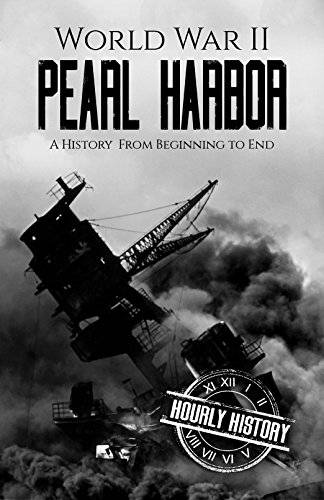

World War II Pearl Harbor: A History From Beginning to End
by Hourly History
World War II Pearl Harbor
Read On Your Computer, MAC, Smartphone, Kindle Reader, iPad, or Tablet.
President Franklin D. Roosevelt described December 7, 1941, the date when the Japanese launched a surprise attack against the United States while the two countries were still officially at peace, as a day that would live in infamy. The action hurled the United States into the global conflict of World War II, a violent conflagration that the nation, fiercely isolationist, had intended to ignore. But the rising tide of militarism across the globe meant that American neutrality could not last. War was contagious, and sooner or later, no matter how a nation tried to quarantine itself, the infection would find it.
To the people of the United States, the attack came as a complete surprise. Perhaps Americans should have expected it. Tensions between the U.S. and Japan had been steadily increasing throughout the year, and American sanctions against Japan were hindering the efforts of the Japanese to become the dominant power in the Pacific.
Inside you will read about...
✓ America Opens the Door to Japan
✓ Pearl Harbor, Home of the Shark Goddess
✓ Air Raid Pearl Harbor, This Is No Drill
✓ The Commanders
✓ The Story of a Survivor
And much more!
Ironically, a mock naval exercise the decade before the Pearl Harbor attack had foreshadowed the penalty of ignoring the base’s vulnerability, but the naval higher-ups refused to believe it, setting the stage for the real attack in 1941. The commander of Pearl Harbor, Admiral Kimmel, was convinced that the attack would be made against Wake Island. But Japanese Admiral Yamamoto’s shrewd planning was as devastating as he intended it to be, as America’s Pacific base lay in ruins—over 2,403 dead, 1,178 wounded, and the fleet devastated. Yet, the day after the attack, while Japan rejoiced, Yamamoto was despondent. Japan, he knew, could not win a long, drawn-out war. The Americans would be out for revenge.
Series Information: World War 2 Battles Book 5
Read On Your Computer, MAC, Smartphone, Kindle Reader, iPad, or Tablet.
President Franklin D. Roosevelt described December 7, 1941, the date when the Japanese launched a surprise attack against the United States while the two countries were still officially at peace, as a day that would live in infamy. The action hurled the United States into the global conflict of World War II, a violent conflagration that the nation, fiercely isolationist, had intended to ignore. But the rising tide of militarism across the globe meant that American neutrality could not last. War was contagious, and sooner or later, no matter how a nation tried to quarantine itself, the infection would find it.
To the people of the United States, the attack came as a complete surprise. Perhaps Americans should have expected it. Tensions between the U.S. and Japan had been steadily increasing throughout the year, and American sanctions against Japan were hindering the efforts of the Japanese to become the dominant power in the Pacific.
Inside you will read about...
✓ America Opens the Door to Japan
✓ Pearl Harbor, Home of the Shark Goddess
✓ Air Raid Pearl Harbor, This Is No Drill
✓ The Commanders
✓ The Story of a Survivor
And much more!
Ironically, a mock naval exercise the decade before the Pearl Harbor attack had foreshadowed the penalty of ignoring the base’s vulnerability, but the naval higher-ups refused to believe it, setting the stage for the real attack in 1941. The commander of Pearl Harbor, Admiral Kimmel, was convinced that the attack would be made against Wake Island. But Japanese Admiral Yamamoto’s shrewd planning was as devastating as he intended it to be, as America’s Pacific base lay in ruins—over 2,403 dead, 1,178 wounded, and the fleet devastated. Yet, the day after the attack, while Japan rejoiced, Yamamoto was despondent. Japan, he knew, could not win a long, drawn-out war. The Americans would be out for revenge.
Series Information: World War 2 Battles Book 5

